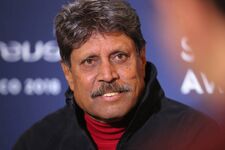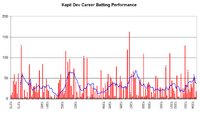Kapil Dev
Kapil Dev
| Full Name | Kapil Dev Ramlal Nikhanj |
|---|---|
| Nickname(s) | Haryana hurricane |
| Born | 6 January 1959, Chandigarh |
| Residence | New Delhi |
| Nationality | |
| Parent(s) | Ramlal Nikhanj (father) and Rajkumari (mother) |
| Gotra | Nikhanj |
| Batting | Right-handed |
|---|---|
| Bowling | Right arm fast |
| Role | Middle order |
| National side |
- Padma Bhushan
- Kapil Dev announced retirement from cricket on 17 October 1994
- Kapil Dev is an Indian former cricketer. He was born on 6 January 1959. He was a hard-hitting middle-order batsman and a fast-medium bowler, making him one of the best all-rounder in the history of cricket. He is the first player in cricket history to have scored over 5,000 runs in Test matches and taken over 400 wickets (434 wickets).
- He became the first Indian captain to win a Cricket World Cup when he led the Indian cricket team to victory in the 1983 Cricket World Cup. At twenty-four, he remains the youngest captain of any team to win the World Cup.
- Kapil Dev retired from cricket in 1994, leaving a lasting legacy as the first player to achieve 200 ODI wickets. Additionally, he held the world record for the highest number of wickets taken in Test cricket, a record that was later surpassed by Courtney Walsh in 2000. Kapil Dev also claimed the record for the highest individual score (175*) by a batsman batting at number 5 or lower in ODIs until 2023 when it was surpassed by Glenn Maxwell.
- Post-retirement, Kapil Dev took on coaching responsibilities for the Indian national team from September 1999 to September 2000, contributing his experience and expertise to the development of the team.
Early Life
Kapil Dev, born Kapil Dev Ramlal Nikhanj on January 6, 1959, into a Sikh Jat family from Punjab, was the son of Ram Lal Nikhanj, a teak merchant, and Rajkumari. His family initially relocated to Fazilka after the Partition before settling in Chandigarh. Kapil Dev's paternal roots trace back to Montgomery (now Sahiwal), and his mother was born in Pakpattan, Okara. Kapil Dev attended D.A.V. College as a student in Chandigarh.
International career
Early years 1978-1982
Dev marked his Test cricket debut in Faisalabad, Pakistan, on October 16, 1978. Despite lackluster match figures, the statistics failed to capture his significant impact. He surprised Pakistani batsmen with his swift pace and bouncers that hit their helmets multiple times. Dev secured his first wicket, Sadiq Mohammad, with his trademark outswinger. Displaying his all-round prowess, he achieved India's fastest Test half-century in just 33 balls with two sixes in each innings during the 3rd Test at the National Stadium, Karachi, although India lost the match and the series 2–0. In the subsequent series against the West Indies, he notched his maiden Test century (126) at Feroz Shah Kotla, Delhi, in just 124 balls, coupled with a consistent bowling performance (17 wickets at 33.00). Signs of Dev's inclination towards England surfaced in the following series, his first outside the sub-continent. Despite claiming his first 5-wicket haul and all of England's wickets, it came at a significant cost (48 overs, 146 runs conceded), as England scored 633 and comfortably won the match. Dev concluded the series with 16 wickets, but his batting contribution of 45 runs (Average: 7.5) was underwhelming. His debut in ODI Cricket occurred in the earlier Pakistan tour, where his individual performance remained ordinary, mirroring India's poor campaign at the 1979 Cricket World Cup.
Dev solidified his status as India's premier fast bowler by securing two 5-wicket hauls and finishing the home series against Australia with 28 wickets (Average: 22.32) and 212 runs, including a half-century. He gained prominence in the 6-Test home series against Pakistan in the 1979–80 season, leading India to two victories – once with the bat (69) at Wankhede Stadium, Bombay, and the second time with both bat and ball (a 10-wicket haul in the match, 4/90 in the first innings and 7/56 in the second innings, along with 84 runs in 98 balls) at Chepauk, Madras (Now Chennai). Dev considers his all-round performance in this match as his career best, and his second innings figure of 7/56 stands as his personal best to date. During the series, he became the youngest Test player to achieve the all-round double of 100 wickets and 1000 runs in 25 matches (although Ian Botham achieved the same feat in just 21 matches) and concluded the series with 32 wickets (Average: 17.68) and 278 runs, including two fifties.
In the 1980–81 Australia tour, India found themselves 1–0 down, defending a mere 143 runs with Dev seemingly ruled out due to a groin injury. However, on the fourth day, with Australia at 18/3, Dev, despite his injury, played the final day with pain-killing injections. He dismantled the dangerous Australia middle order, securing India's victory with an outstanding innings bowling performance of 16.4–4–28–5, ranking among his top five bowling performances. During this Australian tour, he notched his first fifty in ODIs against New Zealand in Brisbane. Despite his Test cricket success, Dev struggled to adapt to ODI cricket, starting with 278 runs (Average: 17.38) and 17 wickets after 16 ODI matches.
Following a disappointing New Zealand tour, Dev geared up for the 1981–82 home series against England. His five-wicket haul in the first test at Wankhede Stadium, Bombay, played a pivotal role in India's victory. Dev excelled with both bat and ball, amassing 318 runs (Average: 53, 1 century, 1 fifty) and taking 22 wickets (2 5-wicket hauls), earning him the Man of the Series honors. In the subsequent series against England in the 1982 season, he continued to shine, opening with a 5-wicket haul and contributing 130 runs, albeit in a losing cause at Lord's. The 3-match series concluded with Dev scoring 292 runs (Average: 73, 3 fifties) and claiming 10 wickets, securing another Man of the Series accolade.
Facing Sri Lanka for the first time in the 1982–83 season, Dev kicked off with a five-wicket haul. In the tour to Pakistan that followed, amidst dominance from rival all-rounder Imran Khan, Dev and Mohinder Amarnath stood out as the bright spots. Dev achieved a 5/102 haul in the second Test at National Stadium, Karachi, 7/220 in the third Test at Iqbal Stadium, Faisalabad, and 8/85 at Gaddafi Stadium, Lahore, despite limited support from other team members. Following this challenging tour, Dev was appointed captain of the Indian cricket team, succeeding Sunil Gavaskar.
Captain: 1983 World Cup Champions (1982–1984)
Dev assumed the role of India's captain during the 1982–83 season, initially leading the team against Sri Lanka when Gavaskar was rested. His first major assignment as the regular captain came during the West Indies tour, where the notable achievement was a lone victory in a One Day International (ODI). Dev's innings of 72, coupled with Gavaskar's 90, propelled India to a formidable score of 282/5 in 47 overs. Dev's two wickets contributed to restricting West Indies to 255, securing a crucial victory. Indian cricketers attribute this win as the confidence boost they needed to face the West Indies team in the 1983 Cricket World Cup. In the overall series, Dev performed well in the West Indies, scoring a century to salvage the second Test match and claiming 17 wickets with an average of 24.94.
1983 World Cup performance
Entering the World Cup with modest individual stats - 32 matches, 608 runs (average: 21), and 34 wickets - India had only secured one victory in the prior two World Cups, against East Africa in 1975. Aided by Yashpal Sharma's 89 runs and contributions from Roger Binny and Ravi Shastri (3 wickets each), India achieved the West Indies' first-ever World Cup defeat. Despite a win against Zimbabwe, losses to Australia (despite Dev's career-best figures of 5/43) and West Indies followed. India now required victories against Australia and Zimbabwe to reach the semifinals.
Facing Zimbabwe at Nevill Ground, Royal Tunbridge Wells on June 18, 1983, India found themselves in a tough spot. However, Kapil Dev, batting with the lower order, stabilized the innings with Roger Binny (22 runs) and Madan Lal. Kapil's half-century came off in 72 balls, and after lunch, he accelerated, reaching his hundred off an even 100 balls. His final 38 balls added 75 runs. Partnering with Kirmani (24 runs), Dev set an unbeaten 126-run stand for the 9th wicket – a world record lasting 27 years (10,000 days). Finishing not out with 175 runs off 138 balls, including 16 boundaries and 6 sixes, Dev's innings is among the Top 10 ODI Batting Performances at No. 4. India won the match by 31 runs.
In the semifinals against England, Dev's three wickets helped limit England to 213. The middle order of Amarnath (46 runs), Yashpal Sharma (61), and Sandeep Patil (51*) secured victory, earning India a spot in the finals against the West Indies. Despite India being restricted to 183 runs, with only Krishnamachari Srikkanth (38 runs) providing relief, Dev's catch of Viv Richards at deep square leg, regarded as one of the finest in ODI Cricket, proved pivotal. West Indies collapsed from 50/1 to 76/6, ultimately being bowled out for 140, with Dev taking the wicket of Andy Roberts and Mohinder Amarnath clinching the final wicket of Michael Holding. India's historic win marked their maiden World Cup, and Dev played a leading role with 303 runs (average: 60.6), 12 wickets (average: 20.41), and 7 catches in 8 matches. This iconic moment served as inspiration for cricketers across India, including Sachin Tendulkar.
Personal life
Amiya Dev, his daughter, was born on January 16, 1996. He wed Romi Bhatia in 1980.
In 1993, Kapil Dev ventured into golf, exploring a new sporting interest. Notably, he became the sole Asian founding member of the Laureus Foundation in 2000, joining a council of 40 that included cricket legends Ian Botham and Viv Richards. Steve Waugh later joined the academy members in 2006 when it expanded to 42 members. Demonstrating his commitment to philanthropy, Dev pledged his organs during an event organized by the Delhi Urological Society on January 31, 2014, at the Airport Authority of India Officers Club in New Delhi.
On October 23, 2020, Dev experienced a heart attack, leading to his hospitalization. Swift medical intervention was required, and he underwent an emergency coronary angioplasty at a hospital in Delhi.
Books
Kapil Dev has authored four books, comprising three autobiographical works and one focused on Sikhism. His autobiographies include By God's Decree (1985), Cricket My Style (1987), and Straight from the Heart (2004). His most recent book, titled We, The Sikhs, was released in 2019, providing insights into Sikhism.
Awards and honours
In recognition of his outstanding contributions to cricket, Kapil Dev received several prestigious honors. In 1982, he was awarded the Padma Shri, followed by the Padma Bhushan in 1991. Wisden honored him in 2002 by naming him the Indian Cricketer of the Century. On March 11, 2010, Kapil Dev was inducted into the ICC Cricket Hall of Fame. In 2013, he was bestowed with the C. K. Nayudu Lifetime Achievement Award, the highest honor presented by the BCCI to a former player. These accolades underscored Kapil Dev's remarkable career and lasting impact on the sport.
In popular culture
Dev has made cameo appearances in various films, including "Dillagi... Yeh Dillagi," "Iqbal," "Chain Khuli ki Main Khuli," and "Mujhse Shaadi Karogi," among others. In addition to his film appearances, he collaborated with Shailendra Singh to release the song "One India My India."
The 2016 Indian film "Azhar," directed by Tony D'Souza, focuses on match-fixing scandals in the late '90s and 2000. In the film, Varun Badola portrays Dev's character. Furthermore, Indian filmmaker Kabir Khan directed the biopic "83," depicting India's first World Cup win in 1983. Ranveer Singh plays the role of Kapil Dev in the film, which is produced by Anurag Kashyap. Notably, Kapil Dev makes a cameo appearance as a spectator in the movie.


